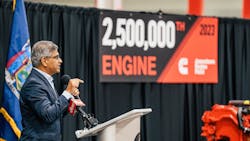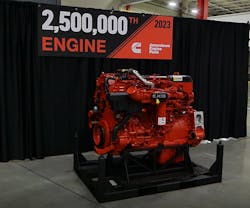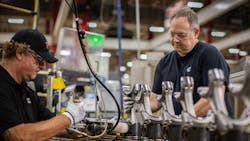Cummins reaches engine milestone: 2.5M engines made at Jamestown plant
JAMESTOWN, New York—As much of the trucking industry looks ahead to electric vehicles, Cummins' attention on May 22 was squarely focused on celebrating its legacy of producing internal combustion engines. The engine maker marked the assembly of its 2.5 millionth engine at its Jamestown Engine Plant (JEP) in New York with a celebration that honored the past and teased the internal combustion technology's future.
The plant produced 500,000 engines during the first 25 of its 49 years in existence, scaling to 2 million over the next quarter century.
"It's remarkable because of the fact that 50% of heavy- and medium-duty trucks that go on our highways are powered by a Cummins engine," announced Srikanth Padmanabhan, Cummins engine business president, to a crowd of employees, media, and others gathered to celebrate the milestone engine, which was assembled April. He added that he's proud of the engines that power fire trucks, school buses, and the American economy.
See also: The emissions race: Does trucking's future still have ICE in its veins?
Cummins upgrades for engines of the future
The nearly one-million-square-foot JEP will receive $452 million in upgrades as the plant prepares to manufacture the 15-liter X15N engine, based on Cummins' fuel-agnostic internal combustion engine platform, an industry-first. The platform accepts various fuel types to reduce emissions, including compressed natural gas and hydrogen. The X15N supports heavy-duty applications with up to 500 horsepower output and will be tested by FleetOwner 500 For-Hire fleets Knight-Swift Transportation, Ryder, UPS, and others.
Padmanabhan and other Cummins leaders took to the mic to spell out the next phase of their "Destination Zero" strategy to produce these lower-carbon fuel engines. Decarbonization is the goal, Padmanabhan said. By 2030, the company plans to reduce carbon emissions by about 25% from where it was in 2018 at 808 GHG emissions.
Cummins' zero-emission business was rebranded as Accelera in March as part of this strategy. While this nascent technology is developed, the X15N and X15H hydrogen engines will provide a critical bridge, Padmanabhan noted
"Battery-electric solutions are not ready yet. Fuel cell electric solutions are not ready yet," Padmanabhan said. "The transition of what we call the messy middle from where we are today to get to that net zero is going to be more carbon fuel solutions—like natural gas, like biodiesel, and hydrogen—and this plant will make that happen."
See also: Eaton adds Cummins powertrain fault codes to IntelliConnect remote diagnostics
Previously, Katie Zarich, director of on-highway communications at Cummins, explained to FleetOwner affiliate Fleet Maintenance how these new engines would benefit the trucking sector.
"The X15N big bore natural gas engine is essential to our commitment to improve NOx," said Katie Zarich, director of on-highway communications at Cummins. "It produces up to a 10% fuel economy and GHG improvement over an ISX12N and can be specified with ratings matching diesels up to 500 HP and 1,850-lb.-ft. of torque. Its size is also reduced compared to a diesel X15, and it weighs more than 500 lbs. less than a current 15-liter diesel and is 200 lbs. lighter than the current ISX12N."
Cummins investing in fuel-agnostic engine platform
JEP Plant Manager Anna Dibble explained that the nearly half-billion-dollar investment would help fund the upgrades to JEP's facilities needed to produce the new fuel-agnostic 15-liter engine platform.
The investment upgrades include a new X15 short-block assembly line to improve ergonomics, safety, quality, efficiency, productivity, and flexibility. An advanced functional test cell upgrade will enhance testing capabilities and energy efficiency of HVAC systems and provide potential fuel reduction.
Each day, 35 tractor-trailers bring parts and equipment into the plant, and 40 semis leave with completed engines. Cummins serves its customers online through distributor locations and earned about $2.2 billion on sales of $28.1 billion in 2022.
The plant currently assembles the X15 and X12 diesel engines and the ISX12N natural gas engines. The X15N, in the Alpha stage, is being prepared for total production. X15 blocks, ISX12 blocks and heads, X12 camshafts, X15 valve and injector camshafts, and flywheels are machined in the plant.
Dibble, who invited the crowd for JEP's 50th anniversary next year, noted that the plant's workers made it all possible.
"Our plant wouldn't be successful without the dedicated employees who serve our company and community each day," Dibble said. "We are proud to have such a strong presence in the community and be able to create a welcoming, caring, and all-inclusive environment for our people to be successful."
This article originally appeared on Fleet Maintenance, a sister site of FleetOwner.


